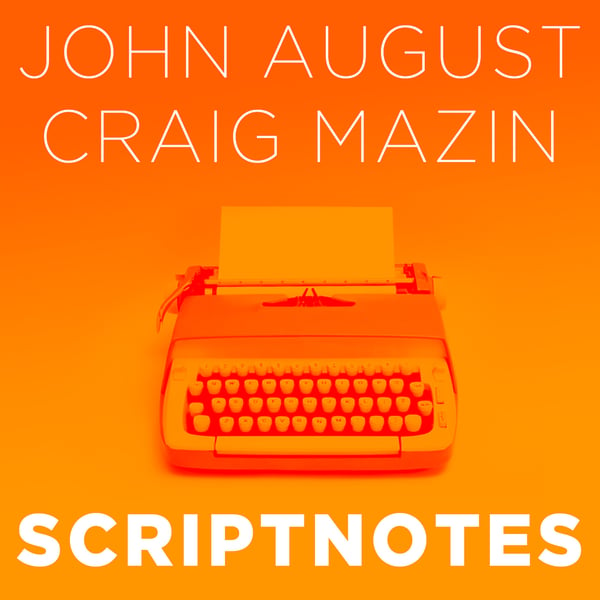614 - Storytelling and the Strike
Scriptnotes Podcast
John August
4.8 • 2.7K Ratings
🗓️ 10 October 2023
⏱️ 77 minutes
🧾️ Download transcript
Summary
John sits down with WGA Negotiating Committee co-chair Chris Keyser to look at how writers crafted the narrative of the strike. From establishing the premise and themes, identifying characters, and all the way down to specific word choices, we dissect the choices, revisions, and tactics used to guide the MBA negotiations to a successful conclusion.
We also answer listener questions on foreign levies and writers’ relationship with the studios going forward.
In our bonus segment for premium members, we discuss Chris Keyser’s debate career and make a strong argument for how it shaped his skills as an orator.
Links:
- Chris Keyser’s speech to members at the start of negotiations
- Scriptnotes, Episode 389 – The Future of the Industry
- One Revolution Per Minute by Erik Wernquist
- American Dream on IMDb
- Christopher Keyser on IMDb
- Chris Keyser at The Oxford Union Society vs. The Harvard Debate Council, 1982
- Get a Scriptnotes T-shirt!
- Check out the Inneresting Newsletter
- Gift a Scriptnotes Subscription or treat yourself to a premium subscription!
- Craig Mazin on Threads and Instagram
- John August on Threads, Instagram and Twitter
- John on Mastodon
- Outro by Rajesh Naroth (send us yours!)
- Scriptnotes is produced by Drew Marquardt and edited by Matthew Chilelli.
Email us at [email protected]
You can download the episode here.
Transcript
Click on a timestamp to play from that location
| 0:00.0 | Hello, and welcome. My name is John August, and this is episode 614 of Script Notes, a podcast about screenwriting, and things that are interesting to screenwriters. |
| 0:10.0 | This week, the DOJ ratified a new contract with the studios, marking the conclusion of the 148-day strike. |
| 0:16.0 | But that's not the end of the story, nor does it fully give a sense of how this all began. |
| 0:20.0 | So today on the show, I want to welcome the co-chair and chief order of the WJ Negotiating Committee, Chris Kaiser, to help us understand the storytelling behind the strike. |
| 0:29.0 | Chris Kaiser, welcome back to Script Notes. |
| 0:31.0 | It's good to see you again, John. It's been a couple of days since I was locked in a room with you for five months. |
| 0:36.0 | We were locked in rooms for a very, very long time, and I know we are all kind of sick of talking about negotiations, but I promise this one is going to be different because it's going to be crafty. |
| 0:45.0 | It's going to be much more like, you know, Greta Gerwig was sitting in your seat a few years back, and we were talking through little women, and we were going through the store like pages of like, you know, of the script, like, why did you make this choice? Why this word, not that word? |
| 0:55.0 | And we're going to the same with you here, because we're going to look at three of your speeches as a framework for talking about the overall kind of narrative and storytelling that was so crucial for this whole campaign for freaking this out. |
| 1:07.0 | So speech in two sequels. |
| 1:09.0 | Speech in two sequels, yes. You became not notorious, but beloved, I'll say, for long speeches, and people loved your long speeches. So we'll talk through those speeches, but also. |
| 1:20.0 | It's long the operative word and all that is that? |
| 1:23.0 | No, inspiring, meaningful, scene-setting speeches. |
| 1:27.0 | Right. |
| 1:28.0 | And I think there's a lot to learn here just in terms of how we tell stories, because in these speeches, you see that we had to establish a premise. |
| 1:37.0 | Identify themes and characters, structure a timeline, and it weirdly is a lot like kind of what we do in our day jobs. |
| 1:44.0 | It was one of the members of the leadership committee, so it was like being in like the best writer's room that just went on for forever. |
| 1:50.0 | Yes, it's true. |
| 1:52.0 | It's true. |
| 1:53.0 | In the end, although we don't start by saying it's a story, in the end we have to tell a story to the members, and they have to believe the story and want to be part of it. |
| 2:01.0 | Yes, and so we have to tell a story that feels true to them, and we have to be honest and truthful with them at every moment. |
| 2:07.0 | Yet we're still always trying to make sure that we're framing in a ways that they can relate to that they can identify with. |
... |
Transcript will be available on the free plan in -539 days. Upgrade to see the full transcript now.
Disclaimer: The podcast and artwork embedded on this page are from John August, and are the property of its owner and not affiliated with or endorsed by Tapesearch.
Generated transcripts are the property of John August and are distributed freely under the Fair Use doctrine. Transcripts generated by Tapesearch are not guaranteed to be accurate.
Copyright © Tapesearch 2025.

